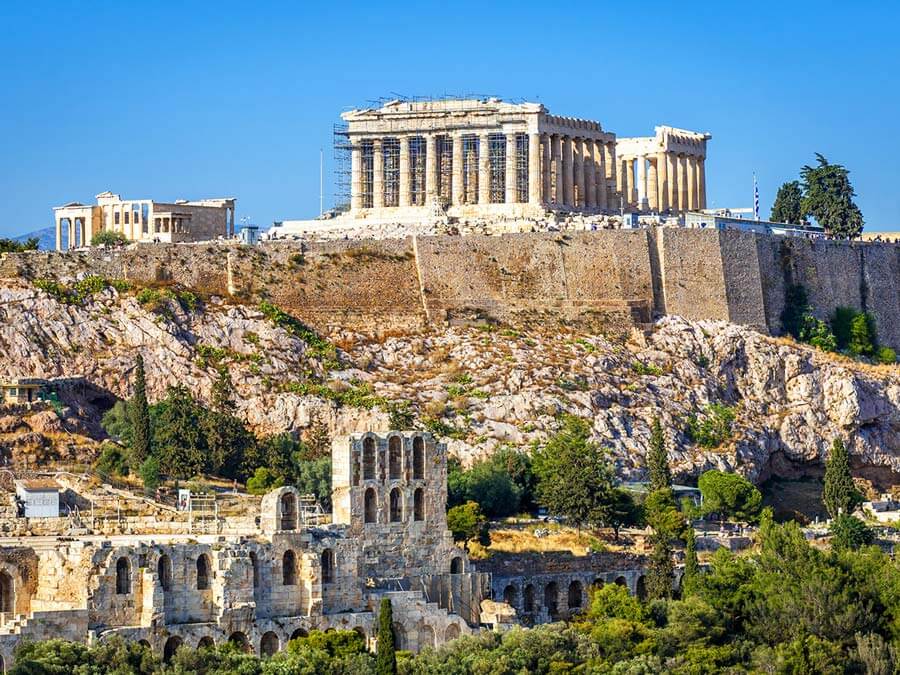Ancient Athens, a walled city, was a powerful city-state, developed in parallel with its port, which was originally Faliro and later Piraeus. Center of the arts and philosophy, the seat of the famed Academy of Plato and the Lyceum of Aristotle, Athens is widely referred to as the cradle of Western civilization, mainly due to the influence of its cultural and political achievements in the 5th and 4th centuries BC.
How Athens was called before
The original name of Athens was Aktaio or Akti and it was taken from its first king, Aktaios. Its second name, Kekropia, was derived from King Kekropas. The history of Athens, the once-mighty city-state of antiquity, begins thousands of years ago and it is fascinating. Whoever knows even a little of this long history, can only feel awe and admiration when they walk in the streets of the city. Wondering in the alleys under the shadow of the Parthenon is like taking a journey through time and following in the footsteps of great ancestors. But how come this famous city came to be known as Athens?
![Credit: Milan Gonda [Shutterstock] The Roman Agora in Athens](/images/Blog/Athens%20name-giving%20myth/Roman-Agora-in-Athens.jpg)
The myth for the name-giving of Athens
The answer seems to be given in a myth of antiquity that was almost lost in the depths of time and concerns the quarrel between two mighty gods of Olympus for the domination of the city. According to Greek mythology, the present capital of Greece is named after the goddess Athena, who prevailed in the confrontation with the sea god Poseidon. A special court was set up on the top of Acropolis Hill and a vote followed for the new patron god of the city.
At that time, the gods wanted to have cities under their patronage (protection), so that the people would honor them by building temples and offering sacrifices and gifts to them. So they began to divide the cities among themselves, but when two gods wanted the same city they ended up quarreling with each other. This was the case with Athens since Poseidon and Athena both challenged the patronage of the city.
The witness of this divine controversy was the king of Kekropia (as Athens was called then), Kekropas, a half-man half-snake creature. According to another version of the same myth, King Kekropas served as the judge to decide the quarrel.
![Credit: Adrian Balea [Pixabay] Statue of Goddess Athena in the Academy of Athens](/images/Blog/Athens%20name-giving%20myth/Athena-statue-in-Athens.jpg)
The remaining gods of Olympus arrived on Acropolis Hill, who had a panoramic view of the city, to be the judges of this quarrel. The scene was set and the battle-ready to begin! It was decided that whoever offers the best gift to the city, he/she will be the winner!
Poseidon’s gift
Poseidon presented his gift first. He stepped forward and with his trident gave a powerful blow to the rocky ground. Immediately, water sprang from the ground, forming a small lake, which was called the "Erechtheida Sea". But the water was sea-water thus, salted and not drinking water.
Athena’s gift
It was then Athena's turn to present her gift. She stepped forward and planted a seed on the rock. Immediately, an olive tree sprouted in the ground, full of fruits. (It was a tree that would survive for thousands of years - rumor has it that, the olive tree we see today on the Acropolis next to the Erechtheion building is Athena’s, sprouting again and again within the centuries.
After both gods had offered their gift, Zeus asked Kekrops for this opinion. The King glanced around from the high rock, but wherever he turned, his eyes met sea water (salty water). But the tree that Athena had made grow was the first in the whole country and was for the city a promise of glory and happiness. The olive tree can offer oxygen, shadow, food, olive oil, wood for the winter… It was truly a unique and useful gift.

It was therefore judged that Athena's gift was more useful and she was given the patronage of the city. And so Athens was renamed, after the goddess of wisdom, Athena! Poseidon, however, got angry with the decision and cursed the city to never have enough water. And so the problem of water scarcity that plagued the city from that time began.
According to the legend, Athena’s olive tree was the first in the world and from that tree, every future olive tree came. Moreover, from that olive tree came the twelve olives of Plato's Academy, which correspond to its twelve gates. According to the legend, they were clones of the Holy Olive of Athena! From them, the famous Olive Grove of Athens was created, which gave its name to the area (Elaionas).
You may also like:
About the author: Our team at Greek TravelTellers consists of academics and lovers of Greek culture. Our vision is to convey our knowledge and Greek values through unique tours and experiences. Through our blog, we hope to bring Greek history and culture closer to you. Feel free to learn more about us.
Featured photo credit: René-Antoine Houasse, Public domain, via Wikimedia Commons




